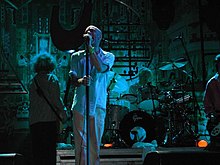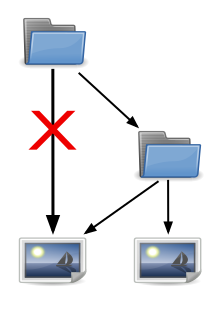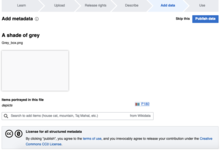Commons:Depicts

Depicts is a feature part of structured data.
How to add a Depicts statement

To add a depicts statement:
- On the file you wish to add information to, select the "Structured data" tab, located below "Open in Media Viewer" and to the right of "File information." If you don't see the "Structured data" tab, (a) Select "Preferences" (b) select "Gadgets" (c) De-select the "Hide Structured Data Tab" setting (d) Scroll down and select "Save" at the bottom of the page (e) For already-open pages that are still missing the "Structured Data" tab, force a refresh to purge the cache for that page
- Select edit, or simply start typing in the search box to get started
- For each depicted item in the image, find the appropriate item from Wikidata and select it
If you have trouble finding the right Wikidata item, test alternative spellings, or try navigating from a Wikipedia page about the item (using the "Wikidata item" link in the "Tools" menu on the left of the Wikipedia page).
If there is no Wikidata item associated with the subject depicted, consider whether it meets Wikidata's Notability standards.[1] If so, consider creating a new item.[2] If not, choose a more generic item which includes your subject as an example.
What items to add
Please only add "depicts" statements conservatively at first, while the community learns how to use this tool best.
Be as specific as you can. For example, for the image File:Black hole - Messier 87 (cropped).jpg the best primary statement is Depicts: Pōwehi (Q3841190).
If there are multiple items clearly and deliberately depicted by the media file, all should be added as separate depicts statements, within reason. For files that depict dozens or hundreds of items (e.g., movies) only list those items which are most prominent.
If groups of the multiple depicted items are a common grouping, and have a grouped item on Wikidata, the grouped item should also be added as a depicts statement. For example File:Bonnieclyde f.jpg depicts: Bonnie and Clyde (Q219937) as well as depicts: Bonnie Parker (Q2319886) and depicts: Clyde Barrow (Q3320282).
Prominence

There is also an option to mark a particular item as "prominent". This property refers to the item's prominence in the piece of media, so a photo like File:Padova REM concert July 22 2003 blue.jpg depicts singer Michael Stipe, bassist Mike Mills, and guitarist Peter Buck but only Stipe is prominent, as he is clearly visible at the center of the photo, whereas Buck is mostly cropped out of the right-hand side and Mills has his back turned to the camera. When querying the structured data, prominent statements can be found be searching for statements with rank "preferred".
What items not to add
Generic items

It has also been suggested (for the purposes of good coverage in the search function) to "tag" more generic items that have your specific item as an instance or subclass. In the File:Black hole - Messier 87 (cropped).jpg example above, you could also imagine adding Depicts: supermassive black hole (Q40392) and Depicts: black hole (Q589), because Pōwehi (Q3841190) is an instance of a subclass (supermassive black hole (Q40392)) of black hole (Q589). This would contrast with how we use categories on Commons, where we try to prevent overcategorization. These generic "tags" should not currently be added if more specific depicts statements already exist. If this guideline changes, these more generic items may later be inferred from the relationships in the structured data on Wikidata.
Parts of a bigger item
The depiction of a face (Q37017) usually implies the presence of a nose (Q7363), nostril (Q858590), and nasal hair (Q1899093). It is not necessary to list them all on every portrait. Instead just state that the portrait depicts the person in the portrait. Anatomical or other compositional relationships can already be modelled within Wikidata.
Items expected to be covered by other statements
Many media include incidental items, actions, locations, context, formatting choices, or background, that are not the primary items depicted. As structured data on Commons expands, we expect to have additional properties enabled where these extra items can be specified. In the meantime, it is best to refrain from specifying these as depicts, unless they are central to the purpose of the media.
For example, some expected properties include:
- location
- depicted in background
- clothing
- format (e.g. monochrome photography, daguerreotype, oil painting, portrait)
- season/date/time
- photographer or artist
- genre (e.g. modern art)
Tool support
Bots
There is an API to create statements, however bot frameworks (such as Pywikibot) may not have implemented it yet, making it less straightforward to add statements via bot. Better implementation will be implemented later.
Upload tools

You can add Depicts statements via the default upload method, UploadWizard.
For other upload methods, support may be added in the future − you may refer to the respective bug tracker of each tool for more information.
Gadgets
- The AC/DC gadget allows to add a collection of structured data statements to a set of files.
- sdc_tool.js lets you quickly add statements to (selected) files on galleries, category pages, and search results.
From Excel
- You can use this Python script to add structured data from an Excel sheet, especially for P180-Depicts
Recent changes
Editing depicts statements shows up in RecentChanges.
Access
Searching depicts statements
Depicts statements can be searched using the keyword haswbstatement. For example, if you wanted to find all instances of depicts (P180) a Q146, use: haswbstatement:P180=Q146.
Advanced search, allowing to retrieve pictures with Depicts using "normal" full-text search, is in development.
Later on, there will likely be a way to query depicts through SPARQL (T141602), as well as access through Lua.
SPARQL access
Depicts, like all statements, can be queried through the SPARQL query service.
API access
Retrieving data
You can retrieve statement using the wbgetentities or wbgetclaims module with the entity ID. For each file there is a Wikibase entity ID MXXXX, XXXX being the page_id. So for example, File:Monument Demba et Dupont.jpg has the page ID 76359368, so the entity ID is M76359368, and you can query wbgetentities&ids=M76359368. An easy way to get the Mid is to use the API action=query&prop=info&titles=File:Monument_Demba_et_Dupont.jpg (the page ID is provided by the pageid field).
Posting data
You can also create statements using wbcreateclaim. See the addClaim() function in this script for an example of how to implement wbcreateclaim in Python.
Notes
- ↑ Wikidata's threshold of notability is lower than Wikipedia's. For Wikidata, the subject is notable if there is a serious and publicly available source describing it. Preferably the source is reliable, independent and secondary, but this is not a hard requirement in Wikidata. Significant coverage is not always required either.
- ↑ You should add at least one statement (for example, instance of or subclass of) to the new item you created, and at least one reference; otherwise the item may be deleted.
